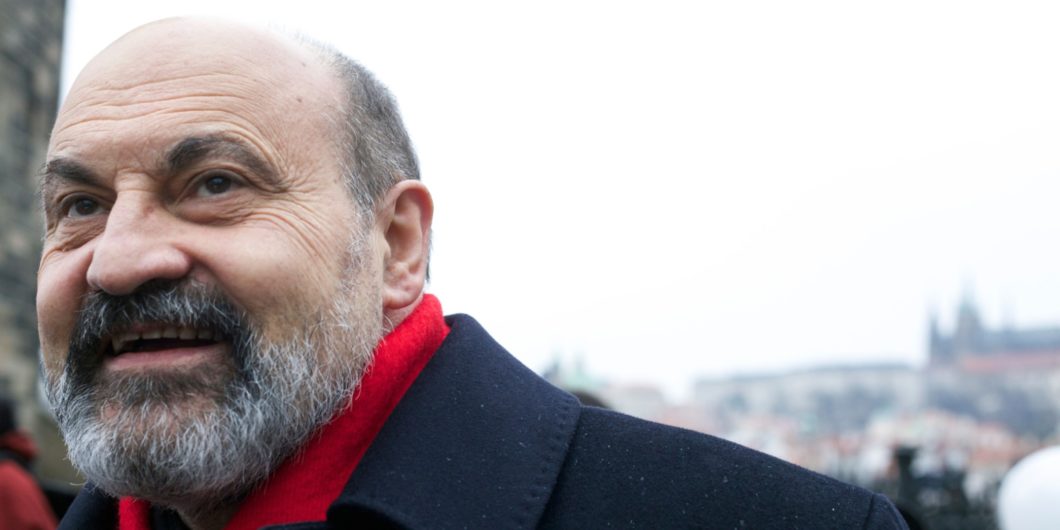Life of a Dissident
When Karol Wojtyła was elected as the new Pope on October 16, 1978, it was not only the start of a 26-year journey in which St. John Paul II became one the most influential figures of the 20th century; in many respects, it was also the beginning of a “revolution of conscience,” as George Weigel has called it, which would ultimately bring down the Soviet Empire in 1989. The peaceful revolutions that occurred all around Eastern Europe were proof that, against the tyranny of communism, no remedy was stronger than the faith in a God that was greater than utopian Marxism.
Whereas much of the historical review of the period has focused on Poland, where this John Paul II movement was most prevalent and had the most visible success, similar developments took place in other Eastern countries. Everywhere within this evil empire, hope arose when the new Slavic Pope implored his hearers to “be not afraid.” For Tomáš Halík, a Catholic priest acting secretly in the Czech underground church, it was similarly a moment of hope that the Soviet totalitarianism which had engulfed his country would end soon.
The story of the religious movements in Czechoslovakia during the Soviet era is little known in contrast to the Polish, which is why Halík’s memoirs, From the Underground Church to Freedom, are a truly fascinating read. Halík has become one of the most important religious voices from the East since the fall of the Berlin Wall. A professor of sociology at Charles University and priest at St. Salvator Church in Prague, he has also taught at Oxford, Cambridge, Harvard, and Notre Dame, and was honored with the Templeton Prize in 2014. A good friend of Václav Havel until Havel’s death in 2011, he has also engaged with the conservative intelligentsia, including Michael Novak, Richard John Neuhaus, and Weigel.
Origins
It all began much less glamorously, however. Born in 1948 to parents that felt—like most of Czechoslovakia—unattached to any formalized religious beliefs, Halík was immediately part of a politically repressed society. The new Communist President put the Archbishop of Prague—who had already been a prisoner in the Dachau concentration camp—under house arrest. Quickly, political opponents were executed and harassed. Priests were jailed and tortured. One priest that Halík came to know had his teeth knocked out, and Soviet officials “hung him up for hours by his feet, burning his body with lighted cigarettes.” Monastic life was largely eliminated, with members of orders sent to forced labor camps, prisons, or uranium mines. Indeed, the Catholic Church was one of the primary targets of the Soviet regime, as Halík notes: “In their eyes the Catholic Church was particularly dangerous because its leadership was in Rome; in other words, it was out of their reach and could not be manipulated.”
While Halík grew up in a secular household, his parents didn’t support the regime. Similarly, Halík himself tended to be provocative as a child, talking fondly about Havel’s plays and presenting essays like Why I Am not a Communist in school. When he was 18 years old, his path to the Catholic faith started in earnest. His story of conversion is easily relatable to many of us converts in today’s world, first trying to read the Bible from front to back—“the usual mistake of potential converts,” he comments—then standing in the very back during Mass, only to move forward over time, and finally gathering the courage to kneel for prayer in front of everyone else. “It takes enormous courage for new believers to kneel or make the sign of the cross in public; they feel as if the entire congregation is looking at them and judging them.”
Eventually, however, the fear went away, since “when God enters our lives, he is not simply a quantity to be added to the ‘things’ that we have become aware of in some way; rather we suddenly see everything in a different light, and our understanding of the world is totally changed.”
“Were there an attempt to make a state ideology out of faith, I would probably be the first dissident—in the name of faith and liberty.”
Tomáš Halík
The suppression of the Prague Spring of 1968 would be the decisive moment in Halík’s life. Studying in the UK at this point, he found out about the Soviet arrival in newspaper headlines: “Russian Tanks in Prague!” With the borders of Czechoslovakia closing soon, he had a decision to make: stay away from his home country and enjoy life in the UK, or move back to Prague. At first, he returned home, for the moment remaining unsure. Then, “like a bolt out of the blue, came the self-immolation of Jan Palach,” which made him “realize that there was something much more profound at stake than simply a political struggle.” Instead, “the real struggle was a spiritual and moral confrontation about the very moral and cultural basis of the nation.” It was at this point that Halík decided to stay in Prague (he would be banned from traveling to the West for the next two decades) and when the first seeds of his plans for priestly vocation were planted.
Eventually, 12 years after being baptized, Halík was clandestinely ordained as a priest in 1978 at the Erfurt Cathedral in Germany. His ordination had to be so shrouded in secrecy that he couldn’t even tell his mother about it—though he lived with her—out of fear that the government would chase her down. From then on, he “spent the next eleven years in the service of the underground church and in a milieu of cultural and political dissent.”
“We Have Been. . . Unable to Subdue His Activity”
Through his work in the dissident movement, Halík would lose multiple jobs and have much greater difficulty in finding new ones. After saying in a speech that “truth is more than power because it is everlasting,” he was told that he would never be allowed to teach at a university again. His later employment at the Ministry of Industry was terminated because authorities pressured the director to get rid of him. Police archives, which have been since made available, show that he was seen “as a particularly dangerous individual,” adding that “we have so far been unable to subdue his activity.”
Instead, despite being under great constraints, the dissident movement, both religious and secular, picked up steam, culminating in the eventual fall of the Soviet Empire thanks to the likes of St. John Paul, Václav Havel, and Halík himself. In the final years of Communism, Halík organized the Decade of Spiritual Renewal, which was a ten-year series of celebrations of different saints that started in 1987 at the millennium of St. Adalbert’s death. Similar to the Polish experience, it envisioned, in Halík’s words, “a revolution of hearts and minds, or rather, cultivation of the overall moral atmosphere of society,” and it quickly became a highly popular forum for Catholic—and thus, inevitably, dissident—ideas.
A mere two years later, the Soviet Union was history, the peaceful revolution “marked by wit, laughter, and singing.” Halík, though, hadn’t yet reached the biggest test. Later in his life, he experienced a “dark night of the soul,” as St. John of the Cross described the feeling when God seems to have left one’s presence. It threw Halík into personal crisis and doubt, and he “was unable to pray. God was silent. It was night.” But even this test, which he movingly describes, he overcame, and ever since he has engaged with manifold worldviews, religions, and traditions around the globe.
It is evident at all times in the book that Halík appreciates the open dialogue between different visions (except once when he uncharacteristically starts a tirade over Brexit and how “the majority—albeit small—of voters had succumbed to fake assertations”). In the Christian Academy which he has led for over 25 years, he has invited Catholic thinkers across the spectrum, from Joseph Ratzinger to Christoph Schönborn, Michael Novak to Walter Kasper, but also secular figures and representatives from other religions (he greatly admires the Dalai Lama, for instance).
At some points, it almost seems like his openness becomes extravagant, accepting indifferently any opinion out there that exists—for instance, when he calls atheism “part of truth” since atheism is merely a “dark night of the soul” from God. But overall, his confrontation with different views and search for truth is admirable.
His open and curious mind also makes it impossible to truly fit him into a box, even on the Catholic spectrum, which is surprising since he grew spiritually during the decisive but often divisive Second Vatican Council. At different points, he chides both traditionalists—“for some young people radical conservatism is just as attractive as left-wing extremism is for others”—and modernizers, such as West German theologians who drew inspiration from Latin America and advocated for Marxist liberation theology, “having not the slightest idea about what was happening just a few kilometers beyond their eastern frontier.” Halík is open to a reform of the celibacy to the Eastern Orthodox model, and yet also had a difficult time stomaching those that see no use for the institution at all.
In a particularly worrisome episode of his post-communist life as a professor at the Theology Department in Prague, he also developed a disdain for integralists, who forced the “correct” Catholic truth alone to be taught in classes without presenting any alternative views. “What was happening under the roof of the Theological Faculty truly had little in common with a university,” and in many regards reminded him of the loyalty that the Communist regime had previously demanded. Instead, “God deserves a free yes,” in which one knows why one believes in something.
Traditionalists looking down on the “decadent West” (many of which still exist today) would use, according to Halík, “the same terms as the Communist potentates once had.” In reality, the much abominated liberal, capitalist West is the best political way. “It is good that we live in a democratic society; I do not yearn for a ‘Catholic state.’ Were there an attempt to make a state ideology out of faith, I would probably be the first dissident—in the name of faith and liberty.”
From the Underground Church to Freedom is a remarkable testament that totalitarianism, particularly in matters of civil debate, is always dangerous and objectionable. The book tells the horrible story of the communist empire and what socialists perpetrated in the 20th century. But it is also a story of a people enduring through all difficulties, eventually ascending spiritually and peacefully as a free people. And Halík’s account should put a demand to us once more: that we should defend this freedom, for individuals, communities, and also our faith, particularly in a time when this freedom is less valued across the political spectrum.


